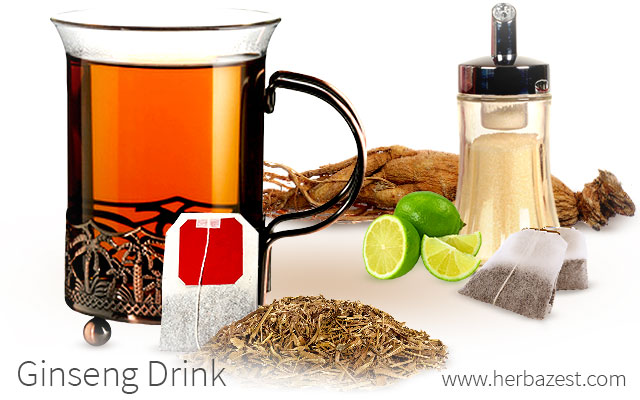Among the various ginseng health benefits, one of the most well-known is its energy boosting quality. In fact, there are many commercial drinks with ginseng in them that around the world. The energizing properties of this root can be obtained from different types of ginseng, but in the competitive market for energy drinks, red ginseng drinks are the most popular. There are several different brands available for sale in stores and online, but it is just as easy to make your own Korean red ginseng drink at home.
How to Make a Ginseng Drink
What you will need:
- 4 small ginseng teabags
- 1-2 small herbal teabags
- 2 quarts of water
- 1 cup lemon juice
- 2 cups of sugar
Directions:
- Brew all of the teabags in one quart of water.
- Mix the lemon juice, sugar, and one quart of water in a large pitcher.
- Add the tea to the large pitcher, mix, and stir.
- Refrigerate for four hours to drink chilled.
Another popular way to consume a red ginseng energy drink is mixed with alcoholic beverages. Vodka is the most common alcohol for ginseng drink recipes. However, is is recommended to add it with caution, as this mix could have adverse side effects.
Ginseng Drink Benefits
Many of the ginseng root benefits - such as improved memory, enhanced physical performance, and a boost in energy - are also very commonly associated with energy drinks.
Because the amount of ginseng in energy drinks is typically far below other ginseng supplements, the consumption of these commercial beverages is generally considered safe. However, as the concentration of ginsenosides, the main constituents of ginseng, is very low in energy drinks, their claimed benefits may be due to the combination of ginseng with other ingredients, such as taurine and caffeine.
Additional proposed red ginseng drink benefits include stimulating immunity, lowering blood sugar, and improving lung function.
Ginseng Drinks Side Effects
Ginseng energy drinks have become extremely popular - especially among young adults and adolescents - due to their performance-enhancing abilities; however, the following potential side effects should be considered:
Increase in heart rate and arterial blood pressure.
High caffeine intake could cause headaches, insomnia, anxiety, and restlessness.
High sugar content could increase risk of obesity, type 2 diabetes, and tooth decay.
Individuals mixing alcoholic beverages with a red ginseng energy drink should be aware that the alcohol significantly increases the possibility of adverse effects.
While there are many energy drinks in the market, a red ginseng drink is easy to make at home and equally effective for boosting energy, as well as for enhancing mental and physical performance. When consumed in moderation, these drinks bring forward some of ginseng's most sought after benefits in an appealing form.
Sources
- International Journal of Health Sciences, Energy Drink Consumption: Beneficial and Adverse Health Effects, 2015
- The Physician and Sportsmedicine, Energy Drinks: A Review of Use and Safety for Athletes, 2010 | Effects of commercial energy drink consumption on athletic performance and body composition, 2010




